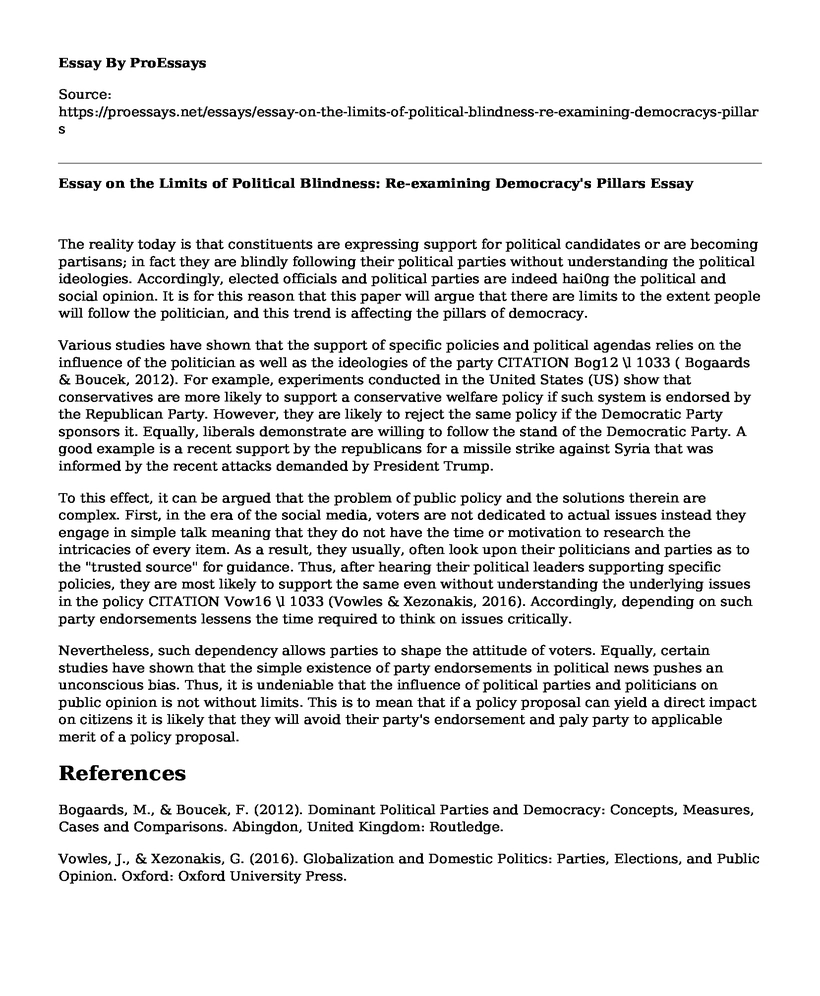The reality today is that constituents are expressing support for political candidates or are becoming partisans; in fact they are blindly following their political parties without understanding the political ideologies. Accordingly, elected officials and political parties are indeed hai0ng the political and social opinion. It is for this reason that this paper will argue that there are limits to the extent people will follow the politician, and this trend is affecting the pillars of democracy.
Various studies have shown that the support of specific policies and political agendas relies on the influence of the politician as well as the ideologies of the party CITATION Bog12 \l 1033 ( Bogaards & Boucek, 2012). For example, experiments conducted in the United States (US) show that conservatives are more likely to support a conservative welfare policy if such system is endorsed by the Republican Party. However, they are likely to reject the same policy if the Democratic Party sponsors it. Equally, liberals demonstrate are willing to follow the stand of the Democratic Party. A good example is a recent support by the republicans for a missile strike against Syria that was informed by the recent attacks demanded by President Trump.
To this effect, it can be argued that the problem of public policy and the solutions therein are complex. First, in the era of the social media, voters are not dedicated to actual issues instead they engage in simple talk meaning that they do not have the time or motivation to research the intricacies of every item. As a result, they usually, often look upon their politicians and parties as to the "trusted source" for guidance. Thus, after hearing their political leaders supporting specific policies, they are most likely to support the same even without understanding the underlying issues in the policy CITATION Vow16 \l 1033 (Vowles & Xezonakis, 2016). Accordingly, depending on such party endorsements lessens the time required to think on issues critically.
Nevertheless, such dependency allows parties to shape the attitude of voters. Equally, certain studies have shown that the simple existence of party endorsements in political news pushes an unconscious bias. Thus, it is undeniable that the influence of political parties and politicians on public opinion is not without limits. This is to mean that if a policy proposal can yield a direct impact on citizens it is likely that they will avoid their party's endorsement and paly party to applicable merit of a policy proposal.
References
Bogaards, M., & Boucek, F. (2012). Dominant Political Parties and Democracy: Concepts, Measures, Cases and Comparisons. Abingdon, United Kingdom: Routledge.
Vowles, J., & Xezonakis, G. (2016). Globalization and Domestic Politics: Parties, Elections, and Public Opinion. Oxford: Oxford University Press.
Cite this page
Essay on the Limits of Political Blindness: Re-examining Democracy's Pillars. (2023, Feb 11). Retrieved from https://proessays.net/essays/essay-on-the-limits-of-political-blindness-re-examining-democracys-pillars
If you are the original author of this essay and no longer wish to have it published on the ProEssays website, please click below to request its removal:
- Liberty in United States
- Argumentative Essay on the Multiple Traditions Theory by Rogers Smith
- Questions and Answers Essay on Government Intervention in the Economy
- Essay Example on Evaluating ESSA's Safe and Healthy Students Policy
- Essay on Addressing Social Factors Affecting Population Health: The Need for Policy Advocacy
- Essay Sample on Beijing in Splendor: Examining the Physical Structure of a City
- Rural Healthcare Quality & Accessibility: Population-Centered Policies Essay







